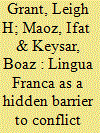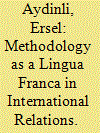| Srl | Item |
| 1 |
ID:
190761


|
|
|
|
|
| Summary/Abstract |
Longstanding intergroup conflict is one of the most perilous issues on the global stage, leading to violence, displacement, and loss of life. Finding strategies to bring parties to the negotiation table is therefore of utmost importance for conflict resolution. Here we address a common problem in intergroup conflict - the lack of a shared, native tongue - which is typically solved by using a lingua franca. Three experimental studies revealed that a peace-building proposal presented in a lingua franca is perceived as less favorable to one’s own side than a proposal presented in one’s native tongue. Specifically, our studies demonstrated that the use of a lingua franca elicits higher levels of hatred and lower levels of sympathy, thereby reducing the perceived favorability of the proposal. Broadly, these findings indicate that the seemingly innocuous choice of the language could have serious implications for conflict resolution as well as for international diplomacy.
|
|
|
|
|
|
|
|
|
|
|
|
|
|
|
|
| 2 |
ID:
175847


|
|
|
|
|
| Summary/Abstract |
Scholarly dialogue between ‘core’ and ‘periphery’ or ‘West/non-West’ in many disciplinary communities has become an issue of discussion in recent decades, spawned in part by increased expectations in many periphery communities of being published in core journals, and complicated by factors such as the linguistic hegemony of English and concerns about access. The International Relations (IR) discipline has been at the forefront of this discussion. However, despite widespread awareness of the issue, and a dedicated push for greater emphasis on local theorising out of the periphery, the cutting edge of global IR scholarship still remains core dominant. This article proposes that a focus on ‘quality’ methodology, in the broadest possible sense of having transparent and effectively applied research designs, could serve as a lingua franca to promote the exchange of ideas in a way less prone to disadvantage periphery scholars. The article goes on to examine this issue by focusing on the case of the Turkish IR disciplinary community. It looks at how methodological issues are currently considered in Turkish IR pedagogy and scholarship and then offers a self-reflective assessment of the quality of methodology in Turkish IR. It concludes by offering suggestions on how the Turkish IR disciplinary community could better address methodological issues and, ultimately, perhaps achieve greater impact within the global IR community.
|
|
|
|
|
|
|
|
|
|
|
|
|
|
|
|